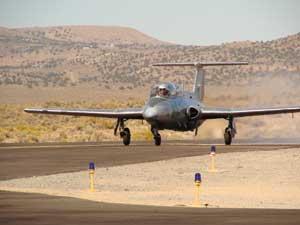B100-powered jet completes flight

January 1, 2009
BY Erin Krueger
Green Flight International successfully completed a biodiesel-powered transcontinental flight across the United States on Nov. 1. Beginning in Reno, Nev., and concluding in Leesburg, Fla., the flight lasted 11 hours and 13 minutes, reaching altitudes of 13,000 to 17,000 feet. According to Douglas Rodante, Green Flight chief executive officer, 1,776 miles of the flight were fueled by B100. The remaining 710 miles of the flight were powered by a mixture of 50 percent biodiesel and 50 percent jet fuel.
A 1968 L29 Delphin, a single engine military jet aircraft built in Czechoslovakia, was used to complete the flight. "We didn't have any problems with cold flow properties in this aircraft because of the design," Rodante said. A system integrated with the aircraft's fuel system allows the fuel to be heated. Engine oil runs through an area surrounding the fuel filter, heating the fuel going through the filter. The heated fuel is circulated back through the fuel tanks. "Our fuel temperature on the flight was 27 degrees Celsius (80 degrees Fahrenheit) and that was up and over 17,000 feet," he said. The plane conducted its first experimental flight on B100 in October in Reno, which led to the transcontinental flight.
According to Rodante, only slight engine adjustments had to be made in order to run the L29 Delphin on B100. "If we used a B20 blend in a modern aircraft, I don't think there would be any modifications that need to be done," he said.
Biodiesel for the test flight was supplied by Lake Erie Biofuels LLC, which also cosponsored the flight. According to Justin Corritore, a spokesman for the 45 MMgy biodiesel plant in Erie, Pa., Green Flight approached the facility because of its biodiesel quality. "We are excited about [the flight] and look forward to working with Green Flight in the future," he said.
Green Flight International, which was founded in 2006, is researching the feasibility of using alternative fuels in the aviation industry as a way to reduce carbon dioxide emissions. According to Rodante, the Federal Aviation Administration intends to use Green Flight's test model as a template for future fuels testing.
In addition, Air New Zealand announced in November plans for a commercial aviation test flight using jatropha-based fuel. The test flight was scheduled to take place Dec. 3 using a blend of 50 percent standard jet fuel and 50 percent synthetic paraffinic kerosene derived from jatropha oil. The two-hour test flight was expected to be conducted using Air New Zealand's Boeing 747-400 Rolls-Royce RB211 engines. The test fuel has been certified as suitable for use by Rolls-Royce.
A 1968 L29 Delphin, a single engine military jet aircraft built in Czechoslovakia, was used to complete the flight. "We didn't have any problems with cold flow properties in this aircraft because of the design," Rodante said. A system integrated with the aircraft's fuel system allows the fuel to be heated. Engine oil runs through an area surrounding the fuel filter, heating the fuel going through the filter. The heated fuel is circulated back through the fuel tanks. "Our fuel temperature on the flight was 27 degrees Celsius (80 degrees Fahrenheit) and that was up and over 17,000 feet," he said. The plane conducted its first experimental flight on B100 in October in Reno, which led to the transcontinental flight.
According to Rodante, only slight engine adjustments had to be made in order to run the L29 Delphin on B100. "If we used a B20 blend in a modern aircraft, I don't think there would be any modifications that need to be done," he said.
Biodiesel for the test flight was supplied by Lake Erie Biofuels LLC, which also cosponsored the flight. According to Justin Corritore, a spokesman for the 45 MMgy biodiesel plant in Erie, Pa., Green Flight approached the facility because of its biodiesel quality. "We are excited about [the flight] and look forward to working with Green Flight in the future," he said.
Green Flight International, which was founded in 2006, is researching the feasibility of using alternative fuels in the aviation industry as a way to reduce carbon dioxide emissions. According to Rodante, the Federal Aviation Administration intends to use Green Flight's test model as a template for future fuels testing.
In addition, Air New Zealand announced in November plans for a commercial aviation test flight using jatropha-based fuel. The test flight was scheduled to take place Dec. 3 using a blend of 50 percent standard jet fuel and 50 percent synthetic paraffinic kerosene derived from jatropha oil. The two-hour test flight was expected to be conducted using Air New Zealand's Boeing 747-400 Rolls-Royce RB211 engines. The test fuel has been certified as suitable for use by Rolls-Royce.
Advertisement
Advertisement
Advertisement
Advertisement
Upcoming Events





